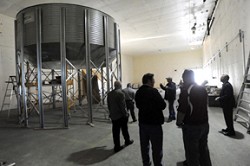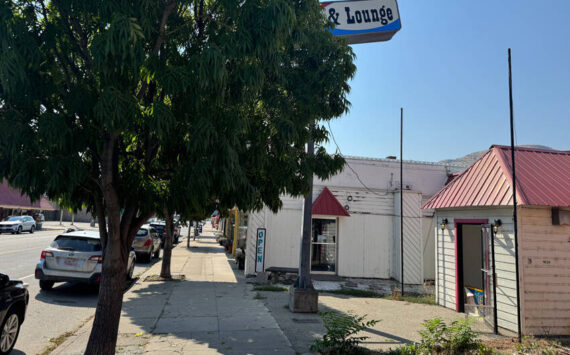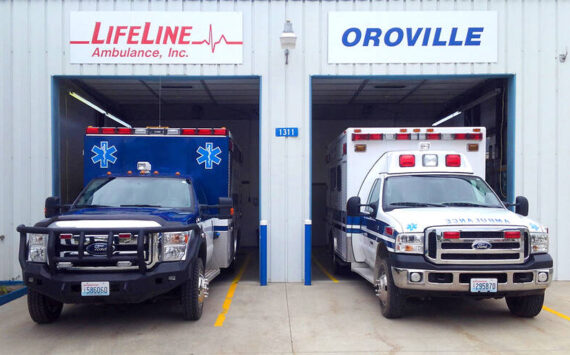 Photo by Gary DeVon
Photo by Gary DeVon
Oneof the hoppers that will feed seeds to one of the two ” title=”1870b” width=”” height=”” class=”size-FULL”>
Photo by Gary DeVon
Oneof the hoppers that will feed seeds to one of the two
OROVILLE – Representatives from Carbon Cycle Crush, a business that plans to create canola oil from seeds trucked in from Canadian growers, met with city, county officials and others to give an update on their plans as well as a tour of their facility.
“I am glad to be here on such a beautiful day, we’ve made a lot of progress since January when I was last here,” said Byran McCann, CEO for Carbon Cycle Investments, the parent company of Carbon Cycle Crush (CCC). “We are not quite where we wanted to be yet, but we’re getting there.”
Tim King, CCC’s President said the company has repaired the roof of the old Oro Warehouse where the seed mills, hoppers and other machinery is being housed. Its owners, Gold Digger Apples, Inc, is leasing the building to the company.
“We’re still shooting for 100 tons a day of seeds from Canada which is what can be carried in two Super B’s with 50 tons each,” said King. “We plan on crushing that much seed every day with meal and oil going out by train or truck.”
King said that although there is the opportunity for someone to buy the canola oil and use it to make biodiesel in Oroville, he doesn’t see CCC making biodiesel in Oroville, but rather selling it to existing plants.
“There are lots of plants doing biodiesel, you have to remove the glycerin first and at that point the oil could be used for food, feed or fuel. There is no need to do secondary processing for fuel as there are several companies out there that do that and we can ship the oil to them,” he said.
King said that crushing the seed yields 65 percent meal and 35 percent oil – 65 tons of meal and 35 tons of oil from crushing 100 tons of seed.
Oroville is a natural for a facility like the company has in mind because of the heavy haul corridor, which allows large capacity trucks from Canada to move their goods to the railhead in town. Although Canola is the largest crop in Canada, there is only the capacity to press about half the seeds produced. In the past farmers from Alberta and elsewhere have had the seeds trucked to Vancouver to be sold into the Asian market.
“They’re trying to export seven million tons of grain by truck through downtown Vancouver,” King said.
The idea of bringing at least part of what is produced to Oroville, rather then to the BC coast appeals to some of the Canadian farmers.
However, with fuel prices at a premium the farmers have been looking for freight to bring back north, rather than hauling empty hopper trucks back to make the trip more economical. King and CCC have been looking into connecting the farmer with local producers of lime and calcium that could be used to naturally enrich the farmers’ land without artificial fertilizers. The same Super Bs that bring the seed to Oroville could be used to haul back these natural fertilizers to Canadian farms.
“Their demands for fertilizer is so great that they’ve been going to places like Pocatello, Idaho for it. They’re even looking on the other side of the Rockies… while they are overlooking a good supply right here,” King said.
The CCC representatives were asked about local farmers growing canola, something the company hopes will be attractive to area growers. King said he believes that there are about 30,000 acres that could be used to grow canola seed and each acre produces about 1 ton of seed. He said that the Colville Confederated Tribe would be experimenting with camelina seed, something else the facility could crush into oil.
Okanogan County Commissioner Jim Detro asked King to tell the people about the benefits of growing canola for wheat farmers. King said wheat farmers in North Dakota who put canola into their rotation saw wheat production increase by as much as 50 percent, plus they also had the canola to market.
He said the company’s plan is to guarantee a base rate to buy a farmer’s canola crop and let them share in part of the profit margin.
Sale of the meal left over after the oil is extracted from the seed also an important part of CCC’s plan. The meal, when mixed one to four with other feeds created an highly enriched feed that producers have discovered naturally ads Omega 3 to milk and eggs from dairy cows and chickens that are fed the meal.
Eventually King said he hopes to see the Oroville facility go from crushing 100 tons a day to 200 with a maximum of 300 tons a day at some point in the future.
“I believe what we will do here will be from 200 to 300 tons of seeds a day and it will set a very nice patter that we can repeat in other areas like Spokane and Douglas counties,” King said.
It all comes down to logistics, according to McCann.
“That’s why getting it right here in Oroville is the right first stem…then we can network other plants with people coming to Oroville to get their training,” he said.
Among those present at the meeting in addition to Commissioner Detro, where Oroville Mayor Chuck Spieth and City Clerk Kathy Jones, Howard Zosel who has been putting his engineering skills to work on making design changes to the old Oro building, Kathryn Martin and Scott Boyer with the Cascade and Columbia Railroad and Greg Moser, general manager of Gold Digger Apples, Inc.
In addition to King and McCann from CCC, those present were also introduced to Pam Leslie, the company’s office manager; Tim Zier, who consults on the financial side of the business; Dean Ruud, local project manager and Ed Gooldy, lead millwright and plant manager.
Most of those who heard the presentation went over to the facility that is being updated to house the mills. They were shown several older mill presses that are being refurbished, as well as two new 50-ton-a-day capacity mills, in addition they got to see one of two new hoppers that is being assembled that will be used to feed the 50 tons of seed into each of the mills.
When the plant begins production it will have a seven-member crew working one shift, at full capacity the plant will have three shifts working 24 hours, seven days a week, according to King.






